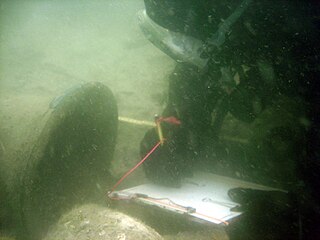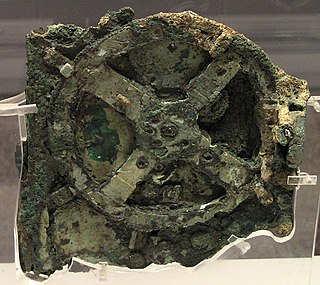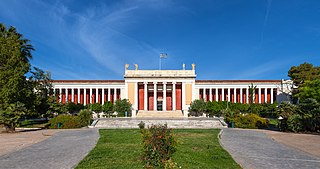Related Research Articles

Maritime archaeology is a discipline within archaeology as a whole that specifically studies human interaction with the sea, lakes and rivers through the study of associated physical remains, be they vessels, shore-side facilities, port-related structures, cargoes, human remains and submerged landscapes. A specialty within maritime archaeology is nautical archaeology, which studies ship construction and use.

Egyptology is the scientific study of ancient Egypt. The topics studied include ancient Egyptian history, language, literature, religion, architecture and art from the 5th millennium BC until the end of its native religious practices in the 4th century AD.

The Antikythera mechanism is an Ancient Greek hand-powered orrery. It is the oldest known example of an analogue computer. It could be used to predict astronomical positions and eclipses decades in advance. It could also be used to track the four-year cycle of athletic games similar to an Olympiad, the cycle of the ancient Olympic Games.
Below are notable events in archaeology that occurred in 1879.

Orchomenus, the setting for many early Greek myths, is best known today as a rich archaeological site in Boeotia, Greece, that was inhabited from the Neolithic through the Hellenistic periods. It is often referred to as "Minyan Orchomenus", to distinguish it from a later city of the same name in Arcadia.
Below are notable events in archaeology that occurred in 1931.
Below are notable events in archaeology that occurred in 1900.
This page lists major events of 2001 in archaeology.
The year 1991 in archaeology involved some significant events.
Below are notable events in archaeology that occurred in 1927.
Below are notable events in archaeology that occurred in 1936.

The National Archaeological Museum in Athens houses some of the most important artifacts from a variety of archaeological locations around Greece from prehistory to late antiquity. It is considered one of the greatest museums in the world and contains the richest collection of Greek Antiquity artifacts worldwide. It is situated in the Exarcheia area in central Athens between Epirus Street, Bouboulinas Street and Tositsas Street while its entrance is on the Patission Street adjacent to the historical building of the Athens Polytechnic university.
The Antikythera wreck is a Roman-era shipwreck dating from the second quarter of the first century BC.
This page lists major events of 2010 in archaeology.
Clarence H. Webb was an American medical doctor and archaeologist who conducted extensive research on prehistoric sites in the southeastern United States. A pediatrician by profession, he became interested in archaeology on a camping trip with his sons where he found some small, triangular points. A distinguished physician, his archaeological research included the study of Caddoan culture, and at a number of major sites such as Poverty Point, John Pearce (just N. of U.S. Hwy 171, a short distance E. of the De Soto and Caddo Parish line, Gahagan, and Belcher Mound.
The year 2014 in archaeology involved some significant events.
This page lists major archaeological events of 2015.
This page lists major events of 2021 in archaeology.
This page lists significant events of 2022 in archaeology.
Kathryn A. Bard is an American archaeologist, academic and author. She is a retired Professor Emerita of Archaeology & Classical Studies from Boston University.
References
- 1 2 3 "The scientific work". Archaeological Museum of Thebes . Retrieved November 23, 2017.
- ↑ Palazzo, Chiara (May 1, 2017). "What is the Antikythera Mechanism? How was this ancient 'computer' discovered?". The Telegraph . London. Retrieved May 28, 2017.
- ↑ Bass, William M. (January 1973). "Lansing man: A half century later". American Journal of Physical Anthropology. 38 (1): 99–104. doi:10.1002/ajpa.1330380124. PMID 4345344.
- ↑ "Clarence Hungerford Webb 1902–1991" (PDF). Cambridge.org. Retrieved June 8, 2017.